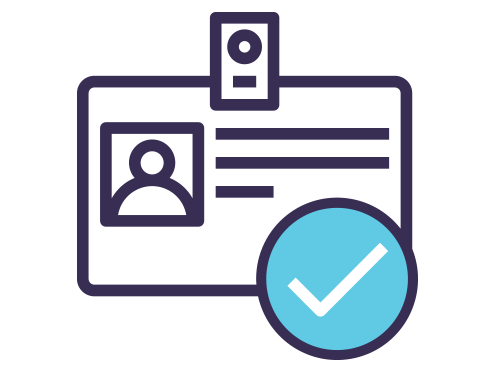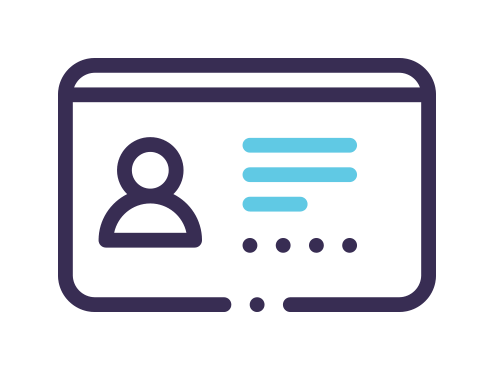
KYC & AML
Global AML legislation requires regulated firms to carry out due diligence to ensure accounts are not being funded by laundered money, nor being used to commit financial crimes or fund terrorist activities. Failing to identify the account holder correctly may mask criminal activities. We ensure new accounts are not listed on Global Sanctions (Watchlist) Registers (UNSCC, OFAC, OSFI, OFSI, SECO), and perform annual reviews.
IDcheck offers a fully automated KYC service, including Biometric Identity Verification, Proof of Address, Credit, Barred Directors and Sanctions Checks, as well as Global Criminal Checks, suitable for client identification, verification and onboarding and can be used as part of AML requirements.

Identity Verification
An essential part of doing business online is verifying the customer or employee’s identity. Whether you sell goods or services or hire and manage staff remotely, every business needs protection against fraud and regulatory violations.
Traditional verification methods are subject to abuse and “account takeover”. Fraudsters, using social engineering, may hack mobile phones and redirect the number into another SIM card to access users’ accounts. This heightens the risk of any method using SMS verification as the second part of Multi-Factor Authentication and is the reason we avoid SMS verifications. Instead IDcheck uses Key-Based 2-Factor Authentication where the PIN is neither transmitted nor stored and would fail after a few incorrect attempts.
Other traditional methods include checking various databases (such as credit and electoral rolls). However, if a “fake” John Smith obtains sufficient data on the “real” John Smith, much of which is publicly available, all database checks would verify the real person and ignore whether the applicant/client is someone else.
As fraudsters increase in sophistication, no solution is foolproof. However, IDcheck’s Biometric Identity & KYC solution will provide a much stricter, more accurate set of identification processes and in turn help mitigate fraud risk.

Age Verification
IDcheck automates Official Document Verification and after confirming the person presenting the document is the genuine person, validates age from the Date of Birth on the official document, to ensure you comply with regulations, such as online Gaming, sales of age-restricted products like vaping and any other marketplace or community with minimum age requirements.
Customise our solution: you choose minimum age 18+ or adjust the number to fit your use case. For example, some online marketplaces and communities may require 13+ while others 25+. Simply tell us your age requirements.

Onboarding
Transaction laundering (also known as credit card laundering or factoring) is a form of money laundering, where the website owner is often unaware and is estimated to top $200 billion in the USA alone. It is a merchant-based fraud scheme using legitimate payment ecosystems, to process payments for criminal enterprises selling firearms, illicit drugs, or financing terrorism via unregulated cross-border transactions. By funnelling unknown payments through verified merchant accounts, transaction launderers incorporate the three steps of money laundering: placement, layering and integration.
IDcheck’s Global KYC program can help E-Commerce and Online Marketplaces identify and onboard customers quickly, with greater assurance and allow you to provide Merchant Service Providers with an audit trail of your customer identification program.

Driver Registration
Imagine a driver caused a fatal accident, or had numerous infractions for “drink driving” and was banned from driving. If that person’s livelihood depended on driving there would be a strong temptation to obtain a fake licence.
Authorities must be confident that driving licences are only issued to the genuine person. Using our own proprietary Facial Recognition, Liveness Check and Motion Analysis algorithms, IDcheck confirms that the Official ID relates to the applicant.

FraudDetection
IDcheck is the only provider to offer real-time Compliance with an audit trail and automate the key regulatory requirements. In their latest reports, both UK (CIFAS) and USA (FTC) Agencies listed Identity Theft as the largest single kind of fraud. With respect to fraudulent documents there are three major categories:
- Counterfeit/Fake ID: An unauthorized reproduction of a genuine document. These documents are neither issued nor recognized by an official authority
- Impersonation: A genuine ID is forged or stolen. It may be a stolen document of someone who looks similar, or a photo may be substituted on top of the original, genuine document
- Synthetic ID: Combining real (stolen) and fake information to create a new identity which does not exist
IDcheck applies multiple machine learning algorithms to ensure documents are genuine. In the case of Electronic Passports, for example, we extract the Machine Readable Code and compare the data within to the visible data on the document, as well as other data held to ensure it is a match. We combine this with our facial recognition, Liveness and Motion Analysis checks, to ensure the document belongs to the actual user.
